

Impact of Social Media on Teenagers – Dove Self-Esteem. Welcome to the dazzling world of social media – where today’s youth are often living their lives out loud and in full view of an online audience.
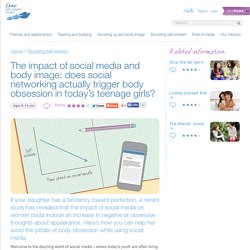
For those of us from a different generation, the sense of “checking in” and letting people know where you are dining, taking pictures of your meal, or even better, snapping that “selfie” after eating that meal may just seem a bizarre concept. But not for these digital natives: in today’s virtual world, getting “likes” on photos, posts or comments can wield a powerful sense of accomplishment and, even more, community acceptance. So, can the constant comparison to another’s physical image online create a sense of body dissatisfaction or worse, begin to trigger intense negative thoughts about body image? Teens on social media: 'Like' and 'FOMO' anxiety. The quest for likes and the fear of missing out can cause social media anxiety among teensAt a recent workshop, teens realized how social media can affect them emotionally Study: The more people checked Facebook, the worse they felt about their lives Conversations about social media need to start when kids are young, says expert Editor's note: Kelly Wallace is CNN's digital correspondent and editor-at-large covering family, career and life.
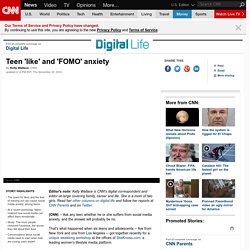
She is a mom of two girls. Read her other columns on digital life and follow her reports at CNN Parents and on Twitter. (CNN) -- Ask any teen whether he or she suffers from social media anxiety, and the answer will probably be no. That's what happened when six teens and adolescents -- five from New York and one from Los Angeles -- got together recently for a unique weeklong workshop at the offices of SheKnows.com, a leading women's lifestyle media platform. Teen likes: The '100 club' Generation stressed: teens boiling over Top 5 parenting mistakes. Positive effects social media have on teens. Nowadays social media plays an important role in teenagers life.
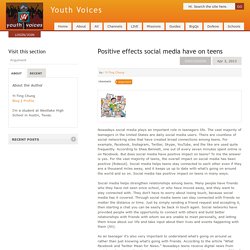
The vast majority of teenagers in the United States are daily social media users. 10 Ways Social Media Affects Mental Health. Since the face of psychology is constantly changing, it is impossible to end the “History of Psychology” series with a definitive, “…and that’s how psychology came to be.”
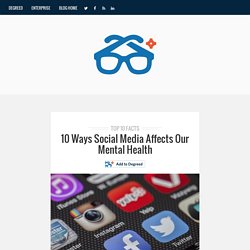
Separate branches of the discipline have formed, medicine has become staggeringly important in treatment and prevention of mental illnesses, theories have formed and crumbled, and scholars have dedicated their careers to advancing the field. The science has been adapted by the masses, and has even become prevalent in pop culture – music (Blink 182’s “Stockholm Syndrome” comes to mind), television, and films have all explored mental illnesses and treatments. The series has only briefly outlined the science’s origins and growth, and it continues to inspire many to study the workings of the human mind.
Luckily, those who came before us provided us with the tools and terminology to hit the ground running and discover incredible things they couldn’t have even imagined. 1. 2. 3. 4. CDC data 5. 6. 7. 8. Does social media impact on body image? Image copyright Thinkstock Magazines and television are often blamed for portraying an ideal body image that causes people to question their looks and lose confidence in themselves.
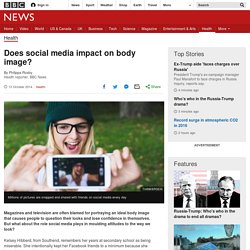
But what about the role social media plays in moulding attitudes to the way we look? Kelsey Hibberd, from Southend, remembers her years at secondary school as being miserable. She intentionally kept her Facebook friends to a minimum because she knew they were the ones who wouldn't pick on her. "I'd always been tall, and I was a bit podgy too," she says. "No-one seemed to notice at primary school, but then in Year 7 everyone started pointing at me, noticing things, making me think I was ugly and not special.
" She became increasingly conscious of even tiny things such as the shape of her eyebrows and size of her forehead. "I would have been subject to much more abuse if I'd had more friends on social media," she says. Kelsey describes the bullying she experienced between the ages of 11 and 16 as "absolutely awful". Influence of Social Media on Teenagers The influence of social media on adolescents and teenagers is of particular importance, not only because this particular group of children is developmentally vulnerable but also because they are among the heaviest users of social networking.
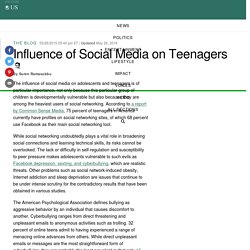
According to a report by Common Sense Media, 75 percent of teenagers in America currently have profiles on social networking sites, of which 68 percent use Facebook as their main social networking tool. While social networking undoubtedly plays a vital role in broadening social connections and learning technical skills, its risks cannot be overlooked. The lack or difficulty in self-regulation and susceptibility to peer pressure makes adolescents vulnerable to such evils as Facebook depression, sexting, and cyberbullying, which are realistic threats.
The American Psychological Association defines bullying as aggressive behavior by an individual that causes discomfort to another. Social Media Has Good and Bad Effects on Kids: Experts. By Serena Gordon HealthDay Reporter MONDAY, March 28 (HealthDay News) -- Social media Web sites, such as Facebook and Twitter, have become nearly inescapable facets of modern life, particularly for kids.
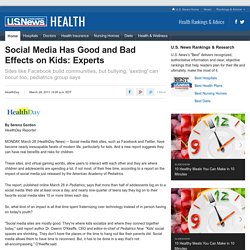
And a new report suggests they can have real benefits and risks for children.